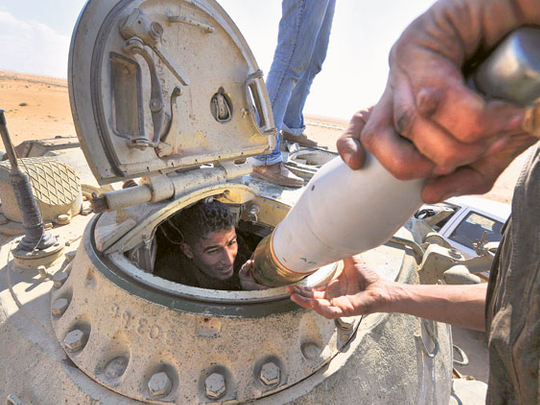
Global conflicts of the past decade have left behind a sour note across the Muslim world. To the ordinary person on the streets across the Islamic world, the notion of one Muslim country after another bearing the brunt of Western military force has only been reinforced with campaigns in Iraq, Afghanistan and now the ongoing effort to force out Libya's leader Colonel Muammar Gaddafi.
Even for the world's most seasoned analysts, it will clearly be impossible to predict with any degree of accuracy how the ongoing Libya campaign will end. Clearly, Gaddafi's own use of brutal power and refusal to accept political dissent in a country he has held together with an iron fist has only added to the case for military intervention in the name of saving human lives in the line of fire.
Clearly there are many double standards in what has driven the Western impetus for military action in Libya. On the one hand, it is evident that protection of civilian lives is an argument that is applied selectively.
But for over four decades, the repeated targeting of Palestinians living in territories occupied by Israel has been ignored as a case deserving action to protect civilians living under the threat of Israeli force. On the other hand, the absence of a long-term plan to help Libya rebuild itself after the conflict once again highlights a familiar trend. The cases of both Iraq and Afghanistan abundantly highlight a similar trend — eagerness to launch a war without a clear strategy on how best to wrap it up later.
As this latest conflict flares up, Islamic countries face compelling questions about their future. The Libyan conflict has been touted as the case of a brutal dictatorship refusing to yield to the popular will of its subjects. That may be the case, but only on the surface.
Down below lies the far more compelling issue of building a progressive state, which not only cares for its subjects but also has the ability to update and reform itself over time. This must involve systems of government capable of responding to citizens needs. There must also be enough space for institutions of popular representation.
Here, the case of Pakistan can well be brought in as an illustrative case. The country has indeed returned to the path of democracy after its former military dictator Pervez Musharraf was forced out of power in 2008.
Multiple challenges
Pakistan faces multiple challenges and there is widespread criticism of its rulers. But the bottom line is that unlike some countries in the Middle East that have recently succumbed to abrupt political change, Pakistan has witnessed dissent through the media and street reaction. For leaders of countries in imminent or potential distress across the Islamic world, the case of Pakistan must illustrate the benefits of providing space for dissent.
More broadly, there must be lessons for Muslim countries in general. Entities like the Arab League and the Organisation of Islamic Conference indeed have stakes in the future of stability across not just the Arab world but in fact the entire Islamic world.
Given the experiences of the past decade with military interventions in Iraq, Afghanistan and now Libya, there is even a stronger case today for the creation of a pan-Islamic peacekeeping force. The idea has been raised before though never brought together, given dissent among Islamic states.
Yet the emerging picture has brought out the need for fresh thinking along the lines of the creation of a pan-Islamic peacekeeping force, armed with the ability to enforce a consensus on member states as well as the means to intervene in unexpected emergencies among the member countries. This is essential to preventing a recurrence of future crises of the kind witnessed in the past decade.
If the Islamic world fails to rise to the occasion, the danger is indeed that of future catastrophes of the kind witnessed in the past decade, which are likely to throw up a familiar outcome.
If indeed there are more interventions in times to come, the world is in danger of witnessing more states around the Islamic world hit by the rigours of armed conflict but left without the means to help them embark on a new future once the conflict ends.
Farhan Bokhari is a Pakistan-based commentator who writes on political and economic matters.











